#Devops career guide
Explore tagged Tumblr posts
Text
What Jobs Go into DevOps: Key Roles in DevOps | OpsNexa!
Discover the many roles in DevOps and how they contribute to the success of modern software development and IT operations. This article delves into the roles that make DevOps work, What Jobs Go into DevOps, the skills needed for each function, and how professionals interact to deliver high-quality software efficiently. Learn about the various job prospects in DevOps, whether you're just getting started or looking to make a change.
#Devops job roles#Devops career path#Devops positions#Devops team structure#careers-in-devops#Devops engineer roles#Devops skillset#Devops career guide
0 notes
Text
How Do I Get Certified in Selenium Automation Testing? A Complete Beginner's Guide
👣 Why Choose Selenium Certification?
If you're planning to build a long-lasting career in automation testing, earning a selenium certificate is a smart first step. In today’s tech-driven world, companies demand skilled testers who can automate web apps efficiently—and a certified selenium testing professional stands out. 🎯
Whether you're new to QA or a manual tester looking to upskill, selenium certifications offer a globally recognized edge. These programs validate your ability to use Selenium WebDriver, build robust frameworks, and run automated tests across browsers and platforms.
📚 What is the Selenium Certification Course About?
A comprehensive selenium certification course teaches you all the must-have skills—right from handling Selenium Grid to integrating tools like Jenkins and Maven. Most importantly, it prepares you for the selenium certification exam, so you can confidently prove your expertise.
You’ll learn to:
Automate real-world testing scenarios.
Apply Selenium tools efficiently.
Boost productivity in DevOps pipelines.
This is not just theory—it's a practical foundation that supports actual job requirements and enhances your confidence. 💼
💰 What’s the Selenium Certification Cost?
The selenium certification cost varies depending on the provider, but GSDC’s program is competitively priced without compromising quality. Becoming a certified selenium testing professional is an investment—not just in your education but in your future career path. Think promotions, new roles, or even freelance consulting. 📈
🎓 How to Pass the Selenium Certification Exam?
To succeed in the selenium certification exam, consistency is key. Take mock tests, practice daily, and go through every module of the selenium certification course thoroughly.
Once certified, you can proudly show off your selenium certificate—a powerful add-on to your resume that shows employers you're serious about test automation. ✅
🚀 Career Growth After Selenium Testing Certification
Completing your selenium testing certification can lead to exciting career opportunities, including roles like:
Automation Test Engineer
QA Analyst
Selenium Consultant
With a selenium certification, you join the ranks of highly sought-after professionals in tech. This credential shows you're equipped to take on automation challenges in real-world projects.
📎 Final Words
Becoming a certified selenium testing professional opens doors to better jobs, better pay, and a secure career path in QA automation. Start your journey now with the GSDC’s trusted selenium certification course and prepare to shine in your next role. ✨
For More Information: - https://www.gsdcouncil.org/certified-selenium-testing-professional
Contact:- +41 41444851189
🏷 Hashtags
#certifiedseleniumtestingprofessional #seleniumcertifications #seleniumcertification #seleniumcertificationexam #seleniumcertificationcost #seleniumtestingcertification #seleniumcertificate #seleniumcertificationcourse
1 note
·
View note
Text
The Roadmap to Full Stack Developer Proficiency: A Comprehensive Guide
Embarking on the journey to becoming a full stack developer is an exhilarating endeavor filled with growth and challenges. Whether you're taking your first steps or seeking to elevate your skills, understanding the path ahead is crucial. In this detailed roadmap, we'll outline the stages of mastering full stack development, exploring essential milestones, competencies, and strategies to guide you through this enriching career journey.

Beginning the Journey: Novice Phase (0-6 Months)
As a novice, you're entering the realm of programming with a fresh perspective and eagerness to learn. This initial phase sets the groundwork for your progression as a full stack developer.
Grasping Programming Fundamentals:
Your journey commences with grasping the foundational elements of programming languages like HTML, CSS, and JavaScript. These are the cornerstone of web development and are essential for crafting dynamic and interactive web applications.
Familiarizing with Basic Data Structures and Algorithms:
To develop proficiency in programming, understanding fundamental data structures such as arrays, objects, and linked lists, along with algorithms like sorting and searching, is imperative. These concepts form the backbone of problem-solving in software development.
Exploring Essential Web Development Concepts:
During this phase, you'll delve into crucial web development concepts like client-server architecture, HTTP protocol, and the Document Object Model (DOM). Acquiring insights into the underlying mechanisms of web applications lays a strong foundation for tackling more intricate projects.
Advancing Forward: Intermediate Stage (6 Months - 2 Years)
As you progress beyond the basics, you'll transition into the intermediate stage, where you'll deepen your understanding and skills across various facets of full stack development.
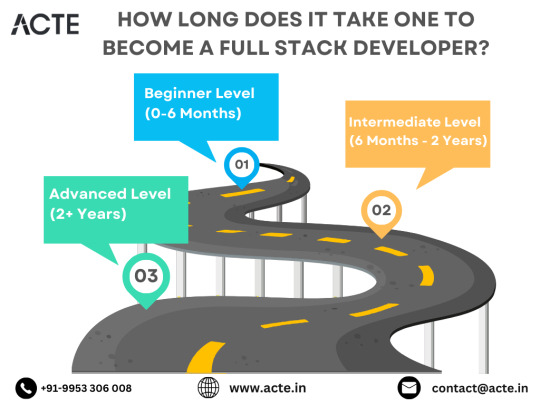
Venturing into Backend Development:
In the intermediate stage, you'll venture into backend development, honing your proficiency in server-side languages like Node.js, Python, or Java. Here, you'll learn to construct robust server-side applications, manage data storage and retrieval, and implement authentication and authorization mechanisms.
Mastering Database Management:
A pivotal aspect of backend development is comprehending databases. You'll delve into relational databases like MySQL and PostgreSQL, as well as NoSQL databases like MongoDB. Proficiency in database management systems and design principles enables the creation of scalable and efficient applications.
Exploring Frontend Frameworks and Libraries:
In addition to backend development, you'll deepen your expertise in frontend technologies. You'll explore prominent frameworks and libraries such as React, Angular, or Vue.js, streamlining the creation of interactive and responsive user interfaces.
Learning Version Control with Git:
Version control is indispensable for collaborative software development. During this phase, you'll familiarize yourself with Git, a distributed version control system, to manage your codebase, track changes, and collaborate effectively with fellow developers.
Achieving Mastery: Advanced Phase (2+ Years)
As you ascend in your journey, you'll enter the advanced phase of full stack development, where you'll refine your skills, tackle intricate challenges, and delve into specialized domains of interest.
Designing Scalable Systems:
In the advanced stage, focus shifts to designing scalable systems capable of managing substantial volumes of traffic and data. You'll explore design patterns, scalability methodologies, and cloud computing platforms like AWS, Azure, or Google Cloud.
Embracing DevOps Practices:
DevOps practices play a pivotal role in contemporary software development. You'll delve into continuous integration and continuous deployment (CI/CD) pipelines, infrastructure as code (IaC), and containerization technologies such as Docker and Kubernetes.
Specializing in Niche Areas:
With experience, you may opt to specialize in specific domains of full stack development, whether it's frontend or backend development, mobile app development, or DevOps. Specialization enables you to deepen your expertise and pursue career avenues aligned with your passions and strengths.
Conclusion:
Becoming a proficient full stack developer is a transformative journey that demands dedication, resilience, and perpetual learning. By following the roadmap outlined in this guide and maintaining a curious and adaptable mindset, you'll navigate the complexities and opportunities inherent in the realm of full stack development. Remember, mastery isn't merely about acquiring technical skills but also about fostering collaboration, embracing innovation, and contributing meaningfully to the ever-evolving landscape of technology.
#full stack developer#education#information#full stack web development#front end development#frameworks#web development#backend#full stack developer course#technology
10 notes
·
View notes
Text
What are the latest trends in the IT job market?

Introduction
The IT job market is changing quickly. This change is because of new technology, different employer needs, and more remote work.
For jobseekers, understanding these trends is crucial to positioning themselves as strong candidates in a highly competitive landscape.
This blog looks at the current IT job market. It offers insights into job trends and opportunities. You will also find practical strategies to improve your chances of getting your desired role.
Whether you’re in the midst of a job search or considering a career change, this guide will help you navigate the complexities of the job hunting process and secure employment in today’s market.
Section 1: Understanding the Current IT Job Market
Recent Trends in the IT Job Market
The IT sector is booming, with consistent demand for skilled professionals in various domains such as cybersecurity, cloud computing, and data science.
The COVID-19 pandemic accelerated the shift to remote work, further expanding the demand for IT roles that support this transformation.
Employers are increasingly looking for candidates with expertise in AI, machine learning, and DevOps as these technologies drive business innovation.
According to industry reports, job opportunities in IT will continue to grow, with the most substantial demand focused on software development, data analysis, and cloud architecture.
It’s essential for jobseekers to stay updated on these trends to remain competitive and tailor their skills to current market needs.
Recruitment efforts have also become more digitized, with many companies adopting virtual hiring processes and online job fairs.
This creates both challenges and opportunities for job seekers to showcase their talents and secure interviews through online platforms.
NOTE: Visit Now
Remote Work and IT
The surge in remote work opportunities has transformed the job market. Many IT companies now offer fully remote or hybrid roles, which appeal to professionals seeking greater flexibility.
While remote work has increased access to job opportunities, it has also intensified competition, as companies can now hire from a global talent pool.
Section 2: Choosing the Right Keywords for Your IT Resume
Keyword Optimization: Why It Matters
With more employers using Applicant Tracking Systems (ATS) to screen resumes, it’s essential for jobseekers to optimize their resumes with relevant keywords.
These systems scan resumes for specific words related to the job description and only advance the most relevant applications.
To increase the chances of your resume making it through the initial screening, jobseekers must identify and incorporate the right keywords into their resumes.
When searching for jobs in IT, it’s important to tailor your resume for specific job titles and responsibilities. Keywords like “software engineer,” “cloud computing,” “data security,” and “DevOps” can make a huge difference.
By strategically using keywords that reflect your skills, experience, and the job requirements, you enhance your resume’s visibility to hiring managers and recruitment software.
Step-by-Step Keyword Selection Process
Analyze Job Descriptions: Look at several job postings for roles you’re interested in and identify recurring terms.
Incorporate Specific Terms: Include technical terms related to your field (e.g., Python, Kubernetes, cloud infrastructure).
Use Action Verbs: Keywords like “developed,” “designed,” or “implemented” help demonstrate your experience in a tangible way.
Test Your Resume: Use online tools to see how well your resume aligns with specific job postings and make adjustments as necessary.
Section 3: Customizing Your Resume for Each Job Application
Why Customization is Key
One size does not fit all when it comes to resumes, especially in the IT industry. Jobseekers who customize their resumes for each job application are more likely to catch the attention of recruiters. Tailoring your resume allows you to emphasize the specific skills and experiences that align with the job description, making you a stronger candidate. Employers want to see that you’ve taken the time to understand their needs and that your expertise matches what they are looking for.
Key Areas to Customize:
Summary Section: Write a targeted summary that highlights your qualifications and goals in relation to the specific job you’re applying for.
Skills Section: Highlight the most relevant skills for the position, paying close attention to the technical requirements listed in the job posting.
Experience Section: Adjust your work experience descriptions to emphasize the accomplishments and projects that are most relevant to the job.
Education & Certifications: If certain qualifications or certifications are required, make sure they are easy to spot on your resume.
NOTE: Read More
Section 4: Reviewing and Testing Your Optimized Resume
Proofreading for Perfection
Before submitting your resume, it’s critical to review it for accuracy, clarity, and relevance. Spelling mistakes, grammatical errors, or outdated information can reflect poorly on your professionalism.
Additionally, make sure your resume is easy to read and visually organized, with clear headings and bullet points. If possible, ask a peer or mentor in the IT field to review your resume for content accuracy and feedback.
Testing Your Resume with ATS Tools
After making your resume keyword-optimized, test it using online tools that simulate ATS systems. This allows you to see how well your resume aligns with specific job descriptions and identify areas for improvement.
Many tools will give you a match score, showing you how likely your resume is to pass an ATS scan. From here, you can fine-tune your resume to increase its chances of making it to the recruiter’s desk.
Section 5: Trends Shaping the Future of IT Recruitment
Embracing Digital Recruitment
Recruiting has undergone a significant shift towards digital platforms, with job fairs, interviews, and onboarding now frequently taking place online.
This transition means that jobseekers must be comfortable navigating virtual job fairs, remote interviews, and online assessments.
As IT jobs increasingly allow remote work, companies are also using technology-driven recruitment tools like AI for screening candidates.
Jobseekers should also leverage platforms like LinkedIn to increase visibility in the recruitment space. Keeping your LinkedIn profile updated, networking with industry professionals, and engaging in online discussions can all boost your chances of being noticed by recruiters.
Furthermore, participating in virtual job fairs or IT recruitment events provides direct access to recruiters and HR professionals, enhancing your job hunt.
FAQs
1. How important are keywords in IT resumes?
Keywords are essential in IT resumes because they ensure your resume passes through Applicant Tracking Systems (ATS), which scans resumes for specific terms related to the job. Without the right keywords, your resume may not reach a human recruiter.
2. How often should I update my resume?
It’s a good idea to update your resume regularly, especially when you gain new skills or experience. Also, customize it for every job application to ensure it aligns with the job’s specific requirements.
3. What are the most in-demand IT jobs?
Some of the most in-demand IT jobs include software developers, cloud engineers, cybersecurity analysts, data scientists, and DevOps engineers.
4. How can I stand out in the current IT job market?
To stand out, jobseekers should focus on tailoring their resumes, building strong online profiles, networking, and keeping up-to-date with industry trends. Participation in online forums, attending webinars, and earning industry-relevant certifications can also enhance visibility.
Conclusion
The IT job market continues to offer exciting opportunities for jobseekers, driven by technological innovations and changing work patterns.
By staying informed about current trends, customizing your resume, using keywords effectively, and testing your optimized resume, you can improve your job search success.
Whether you are new to the IT field or an experienced professional, leveraging these strategies will help you navigate the competitive landscape and secure a job that aligns with your career goals.
NOTE: Contact Us
2 notes
·
View notes
Text
Top Courses for Aspiring Developers: Elevate Your Skills and Career
Nowadays everyone wants to enhance their skills and career. Everyone wants to improve their skills and take their career forward. You want to improve their skill and take your software development career to the next level.
Today’s tech-driven world, aspiring developers are in high demand. Here’s a guide to some of the top courses designed to elevate your skills and boost your career prospects in the field of software development. Developers use web development languages to help create dynamic web pages. The most common coding languages include Javascript, Python and C. we must constantly update our skills. We should assume good skills that will take our career forward. In this article, we will suggest courses that can help to make software developers.
1. Full-Stack Web Development
This course covers everything from front-end technologies like HTML, CSS, and JavaScript to back-end development with Node.js and Express. It’s ideal for those who want to become proficient in both client and server-side programming.
2. Data Science and Machine Learning
This specialization includes courses on machine learning, data mining, and data analysis. It provides a deep dive into algorithms, statistical methods, and practical applications.
3. Cloud Computing
This course prepares you for the AWS Certified Solutions Architect exam. It covers designing distributed systems, deploying scalable applications, and working with AWS services.
4. Mobile App Development
This series of courses is designed for aspiring iOS developers. It covers Swift programming, user interface design, and app development practices.
5. Cybersecurity
This specialization covers essential cybersecurity concepts, including risk management, cryptography, and network security. It’s designed for those interested in protecting systems and data.
6. Game Development
This specialization covers game design principles, development processes, and interactive media creation. It includes courses on Unity and Unreal Engine, two of the most popular game development platforms.
7. Software Engineering
This course provides a comprehensive overview of software engineering principles, including design patterns, testing, and project management.
8. DevOps
This course introduces key DevOps concepts such as continuous integration, continuous delivery, and infrastructure as code. It’s ideal for developers looking to improve collaboration between development and operations.
By identifying the right courses and doing those courses, we can follow the path of success. As you consider the courses to take, we should do the courses in which we are interest.
Top Courses for Aspiring Developers: Elevate Your Skills and Career
Nowadays everyone wants to enhance their skills and career. Everyone wants to improve their skills and take their career forward. You want to improve their skill and take your software development career to the next level.
Today’s tech-driven world, aspiring developers are in high demand. Here’s a guide to some of the top courses designed to elevate your skills and boost your career prospects in the field of software development. Developers use web development languages to help create dynamic web pages. The most common coding languages include Javascript, Python and C. we must constantly update our skills. We should assume good skills that will take our career forward. In this article, we will suggest courses that can help to make software developers.
1. Full-Stack Web Development
This course covers everything from front-end technologies like HTML, CSS, and JavaScript to back-end development with Node.js and Express. It’s ideal for those who want to become proficient in both client and server-side programming.
2. Data Science and Machine Learning
This specialization includes courses on machine learning, data mining, and data analysis. It provides a deep dive into algorithms, statistical methods, and practical applications.
3. Cloud Computing
This course prepares you for the AWS Certified Solutions Architect exam. It covers designing distributed systems, deploying scalable applications, and working with AWS services.
4. Mobile App Development
This series of courses is designed for aspiring iOS developers. It covers Swift programming, user interface design, and app development practices.
5. Cybersecurity
This specialization covers essential cybersecurity concepts, including risk management, cryptography, and network security. It’s designed for those interested in protecting systems and data.
6. Game Development
This specialization covers game design principles, development processes, and interactive media creation. It includes courses on Unity and Unreal Engine, two of the most popular game development platforms.
7. Software Engineering
This course provides a comprehensive overview of software engineering principles, including design patterns, testing, and project management.
8. DevOps
This course introduces key DevOps concepts such as continuous integration, continuous delivery, and infrastructure as code. It’s ideal for developers looking to improve collaboration between development and operations.
By identifying the right courses and doing those courses, we can follow the path of success. As you consider the courses to take, we should do the courses in which we are interest.
2 notes
·
View notes
Text
Azure DevOps Training
Azure DevOps Training Programs

In today's rapidly evolving tech landscape, mastering Azure DevOps has become indispensable for organizations aiming to streamline their software development and delivery processes. As businesses increasingly migrate their operations to the cloud, the demand for skilled professionals proficient in Azure DevOps continues to soar. In this comprehensive guide, we'll delve into the significance of Azure DevOps training and explore the myriad benefits it offers to both individuals and enterprises.
Understanding Azure DevOps:
Before we delve into the realm of Azure DevOps training, let's first grasp the essence of Azure DevOps itself. Azure DevOps is a robust suite of tools offered by Microsoft Azure that facilitates collaboration, automation, and orchestration across the entire software development lifecycle. From planning and coding to building, testing, and deployment, Azure DevOps provides a unified platform for managing and executing diverse DevOps tasks seamlessly.
Why Azure DevOps Training Matters:
With Azure DevOps emerging as the cornerstone of modern DevOps practices, acquiring proficiency in this domain has become imperative for IT professionals seeking to stay ahead of the curve. Azure DevOps training equips individuals with the knowledge and skills necessary to leverage Microsoft Azure's suite of tools effectively. Whether you're a developer, IT administrator, or project manager, undergoing Azure DevOps training can significantly enhance your career prospects and empower you to drive innovation within your organization.
Key Components of Azure DevOps Training Programs:
Azure DevOps training programs are meticulously designed to cover a wide array of topics essential for mastering the intricacies of Azure DevOps. From basic concepts to advanced techniques, these programs encompass the following key components:
Azure DevOps Fundamentals: An in-depth introduction to Azure DevOps, including its core features, functionalities, and architecture.
Agile Methodologies: Understanding Agile principles and practices, and how they align with Azure DevOps for efficient project management and delivery.
Continuous Integration (CI): Learning to automate the process of integrating code changes into a shared repository, thereby enabling early detection of defects and ensuring software quality.
Continuous Deployment (CD): Exploring the principles of continuous deployment and mastering techniques for automating the deployment of applications to production environments.
Azure Pipelines: Harnessing the power of Azure Pipelines for building, testing, and deploying code across diverse platforms and environments.
Infrastructure as Code (IaC): Leveraging Infrastructure as Code principles to automate the provisioning and management of cloud resources using tools like Azure Resource Manager (ARM) templates.
Monitoring and Logging: Implementing robust monitoring and logging solutions to gain insights into application performance and troubleshoot issues effectively.
Security and Compliance: Understanding best practices for ensuring the security and compliance of Azure DevOps environments, including identity and access management, data protection, and regulatory compliance.
The Benefits of Azure DevOps Certification:
Obtaining Azure DevOps certification not only validates your expertise in Azure DevOps but also serves as a testament to your commitment to continuous learning and professional development. Azure DevOps certifications offered by Microsoft Azure are recognized globally and can open doors to exciting career opportunities in various domains, including cloud computing, software development, and DevOps engineering.
Conclusion:
In conclusion, Azure DevOps training is indispensable for IT professionals looking to enhance their skills and stay relevant in today's dynamic tech landscape. By undergoing comprehensive Azure DevOps training programs and obtaining relevant certifications, individuals can unlock a world of opportunities and propel their careers to new heights. Whether you're aiming to streamline your organization's software delivery processes or embark on a rewarding career journey, mastering Azure DevOps is undoubtedly a game-changer. So why wait? Start your Azure DevOps training journey today and pave the way for a brighter tomorrow.
5 notes
·
View notes
Text
AWS DevOps Careers: Navigating the Cloud-Infused Professional Landscape
In the rapidly evolving tech terrain, the confluence of AWS and DevOps has given rise to a dynamic realm, promising an array of career prospects. This all-encompassing guide unveils the diverse roles and responsibilities within AWS DevOps, offering insights into the multifaceted career avenues that await proficient individuals.
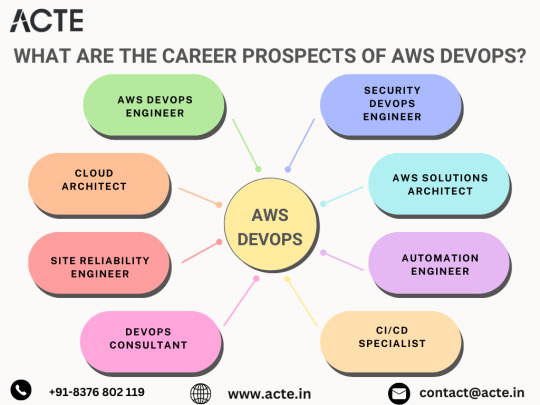
1. Crafting Cloud Solutions: The Role of an AWS DevOps Engineer
Overview: AWS DevOps Engineers serve as architects of automated software development, leveraging AWS cloud services.
Responsibilities: Dive into Infrastructure as Code (IaC), fine-tune AWS tools, and champion the principles of Continuous Integration/Continuous Deployment (CI/CD).
2. Architecting Scalable Cloud Solutions: The Realm of Cloud Architects
Overview: Cloud Architects design scalable and reliable cloud infrastructure on AWS, seamlessly aligning with DevOps principles.
Responsibilities: Collaborate to optimize AWS services, ensuring a resilient and scalable cloud environment.
3. Reliability in the Cloud: The Role of a Site Reliability Engineer (SRE)
Overview: SREs focus on ensuring system reliability, availability, and performance on AWS through vigilant monitoring and automation.
Responsibilities: Implement automation strategies, monitor AWS resources, and respond adeptly to incidents.
4. DevOps Consultancy: Guiding Organizations to DevOps Excellence
Overview: DevOps Consultants provide expertise in implementing DevOps practices, specializing in AWS services.
Responsibilities: Offer guidance on best practices, implement CI/CD pipelines, and optimize workflows using AWS tools.
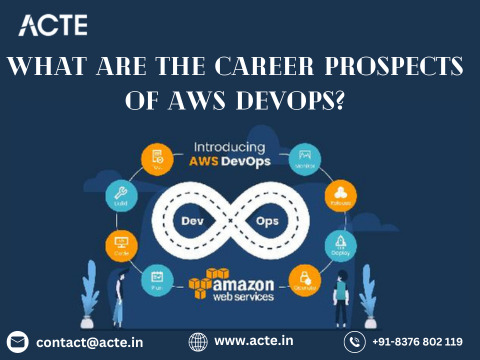
5. Embedding Security into DevOps: The Role of a Security DevOps Engineer (DevSecOps)
Overview: DevSecOps Engineers integrate security practices into the AWS DevOps pipeline.
Responsibilities: Implement robust security measures, conduct risk assessments, and ensure compliance with security policies.
6. Solutions Architecture on AWS: Crafting Business-Aligned Solutions
Overview: AWS Solutions Architects design and implement solutions aligned with business requirements, utilizing AWS services.
Responsibilities: Collaborate across teams, grasp project intricacies, and architect solutions that optimize AWS resources.
7. Scripting the Future: The Role of an Automation Engineer in AWS
Overview: Automation Engineers script and automate processes within AWS DevOps.
Responsibilities: Script infrastructure deployment, automate testing processes, and lead AWS automation initiatives.
8. Streamlining Software Delivery: The Role of a CI/CD Specialist on AWS
Overview: CI/CD Specialists optimize and streamline the software delivery pipeline within the AWS environment.
Responsibilities: Configure and manage CI/CD tools, ensuring the efficient and reliable delivery of software.
Embarking on an AWS DevOps career journey presents professionals with a landscape rich in challenges and opportunities. Each role within AWS DevOps contributes to a fulfilling and dynamic career trajectory, promising innovation and significant contributions to the ever-evolving technological realm. Best of luck as you navigate the transformative path of AWS DevOps careers!
2 notes
·
View notes
Text
Crafting a Career Odyssey: AWS Certification Unveiled for Solution Architects
Embarking on the journey of AWS certification as a Solution Architect unveils a plethora of career avenues, transforming your professional trajectory in the dynamic landscape of cloud computing. Let's explore the myriad paths that unfold for certified AWS Solution Architects:
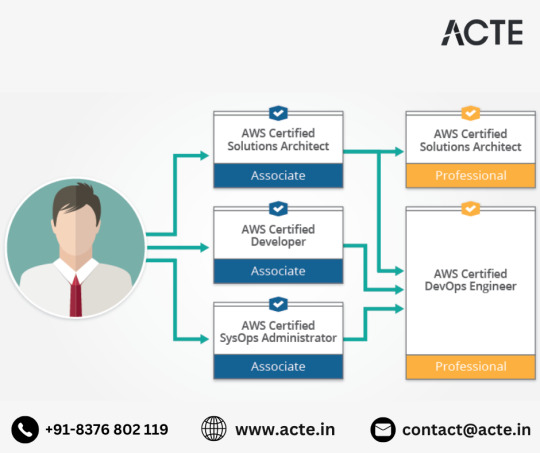
1. Architecting Excellence: Steering Digital Transformations AWS certification catapults you into roles where you architect and implement cutting-edge solutions. As a linchpin in digital transformations, you play a pivotal role in creating scalable, secure, and cost-effective solutions aligned with organizational objectives.
2. Cloud Architect Mastery: Orchestrating Comprehensive Cloud Strategies The journey doesn't stop at Solution Architect; it seamlessly transitions into broader Cloud Architect roles. Here, you orchestrate end-to-end cloud strategies, ensuring optimal performance, security, and efficiency in cloud-based environments.
3. Enterprise Architect Pinnacle: Shaping Holistic IT Strategies With AWS certification, the pathway extends to Enterprise Architect roles. This involves shaping the overarching IT strategy, aligning technology solutions with business goals, and ensuring seamless integration across the enterprise.
4. Cloud Consulting Expertise: Guiding Clients on Cloud Journey Organizations seek AWS-certified Solution Architects for Cloud Consultant positions, where you provide guidance on cloud strategies, migration plans, and optimize AWS infrastructure for enhanced performance.
5. Technical Leadership Zenith: Guiding Development Initiatives Expertise gained through AWS certification positions you favorably for technical leadership roles. Leading teams, guiding development projects, and offering strategic input on technology initiatives become part of your purview.
6. DevOps Alchemy: Bridging Development and Operations The fusion of AWS expertise and Solution Architect skills opens doors to DevOps Engineer opportunities. Your grasp of cloud infrastructure proves invaluable in optimizing continuous integration and deployment pipelines.
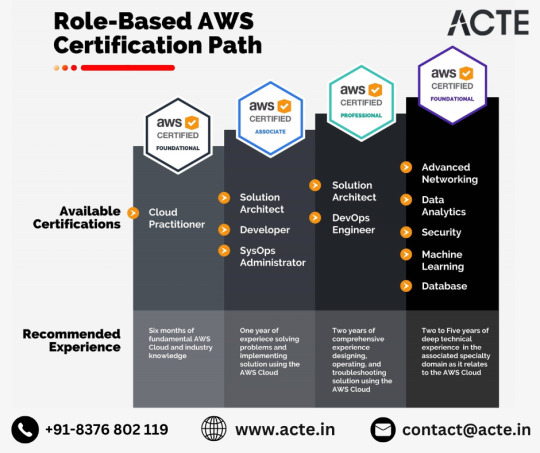
7. Pre-Sales Artistry: Crafting Compelling Solutions Leverage AWS certification in Pre-Sales Solutions Architect positions. Engaging with clients during the pre-sales phase, you become instrumental in understanding their needs and crafting compelling solutions.
8. Specialized Architectural Prowess: Exploring Niche Opportunities As technology evolves, specialized Solution Architect roles emerge. Depending on your interests and the evolving AWS service landscape, opportunities in areas like AI/ML architecture, IoT solutions, or serverless architectures beckon.
9. Entrepreneurial Odyssey: Beyond Conventional Paths Armed with AWS certification, entrepreneurial pursuits become viable. Whether offering specialized AWS services or launching a tech startup, the certification serves as a foundation for innovative endeavors.
10. Lifelong Learning Odyssey: Staying Ahead in the Dynamic AWS Realm The AWS ecosystem is dynamic, with constant updates and new services. Your certification journey becomes a springboard for continuous learning and professional development, ensuring you remain at the forefront of cloud technology.
In conclusion, AWS certification for Solution Architects is not just a validation; it's a compass guiding you through a rich tapestry of career possibilities. Whether crafting digital landscapes, steering enterprises through the cloud, or exploring niche opportunities, the certification becomes a catalyst for continuous growth, learning, and innovation in the ever-evolving cloud computing domain.
2 notes
·
View notes
Text
Bridging the Gap: A Developer's Roadmap to Embracing DevOps Excellence
In the ever-evolving landscape of software development, the role of a DevOps engineer stands out as a crucial link between development and operations. For developers with an eye on this transformative career path, acquiring a unique skill set and embracing a holistic mindset becomes imperative. In the city of Hyderabad, DevOps Training offers a strategic avenue for individuals keen on validating their proficiency in DevOps practices and enhancing their career trajectory.

Charting the DevOps Odyssey: A Developer's Comprehensive Guide
Shifting gears from a developer to a DevOps engineer involves a nuanced approach, harmonizing development expertise with operational acumen. Here's a detailed step-by-step guide to assist developers aspiring to embark on the dynamic journey into the world of DevOps:
1. Grasp the Fundamentals of DevOps: Establish a solid foundation by delving into the core principles of DevOps, emphasizing collaboration, automation, and a culture of continuous improvement. Recognize the significance of the cultural shift required for successful DevOps implementation.
2. Master Git and Version Control: Dive into the world of version control with a mastery of Git, including branches and pull requests. Proficiency in these areas is pivotal for streamlined code collaboration, versioning, and effective tracking of changes.
3. Cultivate Scripting Skills (e.g., Python, Shell): Cultivate essential scripting skills to automate mundane tasks. Languages like Python and Shell scripting play a key role in the DevOps toolchain, providing a robust foundation for automation.
4. Explore Containers and Kubernetes: Immerse yourself in the realms of containerization with Docker and orchestration with Kubernetes. A comprehensive understanding of these technologies is fundamental for creating reproducible environments and managing scalable applications.
5. Grasp Infrastructure as Code (IaC): Familiarize yourself with Infrastructure as Code (IaC) principles. Tools like Terraform or Ansible empower the codification of infrastructure, streamlining deployment processes. The pursuit of the Best DevOps Online Training can offer profound insights into leveraging IaC effectively.

6. Experiment with Continuous Integration/Continuous Deployment (CI/CD): Take the leap into CI/CD territory with experimentation using tools like Jenkins or GitLab CI. The automation of code testing, integration, and deployment is pivotal for ensuring swift and reliable releases within the development pipeline.
7. Explore Monitoring and Logging: Gain proficiency in monitoring and troubleshooting by exploring tools like Prometheus or Grafana. A deep understanding of the health and performance of applications is crucial for maintaining a robust system.
8. Foster Collaboration with Other Teams: Cultivate effective communication and collaboration with operations, QA, and security teams. DevOps thrives on breaking down silos and fostering a collaborative environment to achieve shared goals.
Remember, the transition to a DevOps role is an evolutionary process, where gradual incorporation of DevOps practices into existing roles, coupled with hands-on projects, fortifies the foundation for a successful journey towards becoming a DevOps engineer.
3 notes
·
View notes
Text
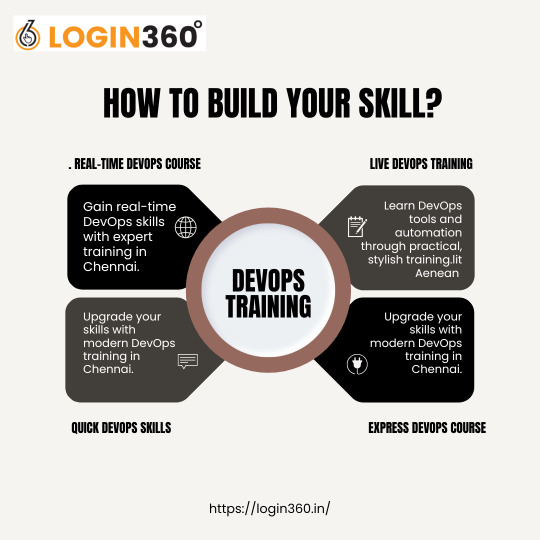
https://login360.in/best-devops-certification-course-in-chennai/
Best DevOps Certification Course in Chennai |
Best DevOps Certification Course in Chennai – Learn by Doing
When it comes to building a strong DevOps career, hands-on learning is key. The Best DevOps Certification Course in Chennai offers live project-based training that helps you understand DevOps in real-world scenarios.
This course is built to teach you practical DevOps workflows—right from source code management with Git, automated builds using Jenkins, to containerization with Docker, and orchestration with Kubernetes. It also includes cloud deployment modules on AWS and Azure.
One of the highlights is its project-based learning approach. You’ll create CI/CD pipelines, deploy sample applications, and work on monitoring solutions—just like engineers in top tech companies.
The course is led by expert trainers who have years of industry experience. Whether you’re a fresher or someone from a non-coding background, the curriculum is structured to guide you from basics to advanced levels step-by-step.
You’ll also receive certification support, interview training, and resume preparation assistance. Many past learners have secured roles in reputed IT firms soon after completing this course.
Both classroom and online sessions are available, giving you the flexibility to learn at your pace. If you're looking for practical DevOps training that prepares you for real jobs, this is the course for you.
Start your journey today with the top DevOps certification course in Chennai!
0 notes
Text
How Bharathi Degree College Prepares You for Tech Jobs
A Launchpad for Digital Careers
As India cements its status as the next global tech powerhouse, the demand for job-ready tech professionals has surged across sectors. Companies today are not only scouting for coders or analysts—they’re investing in problem-solvers, innovators, and digitally fluent professionals. In the midst of this transformation, Bharathi Degree College, widely recognized as the best degree college in Warangal, has taken bold steps to position its students at the forefront of the tech job market.
Whether you're a student, a newlywed couple mapping your future, or an entrepreneur seeking to upskill your team, this 2500-word article reveals how Bharathi Degree College blends curriculum, mentorship, and digital innovation to fuel real-world tech careers.Why Tech Jobs Matter in Today’s Economy
India’s IT sector is projected to grow to $350 billion by 2026 (NASSCOM), with rising employment in:
Software Development & App Engineering
Data Science, AI, and Machine Learning
Cloud Computing & DevOps
Cybersecurity and Digital Infrastructure
Just as wedding photography in India has transitioned from static studio shoots to cinematic drone-based storytelling, the tech job landscape now demands storytelling through code, data, and scalable systems.Bharathi Degree College: Your Gateway to a Tech-Driven Future 1. Tech-Infused Curriculum
Bharathi Degree College’s syllabus is regularly updated to meet the needs of the ever-changing tech world:
Core Programming: Python, Java, C++, and JavaScript
Database & Cloud Systems: MySQL, MongoDB, AWS Fundamentals
AI/ML Basics: Algorithms, Neural Networks, TensorFlow foundations
Web & App Development: Full-stack architecture, UI/UX design
DevOps Tools: Git, Docker, Kubernetes, Jenkins (Introductory modules)
2. Skill-Centric Learning Framework
Weekly coding labs with real-world programming challenges
Annual hackathons judged by tech professionals
Open-source contribution sprints and GitHub portfolio building
Each component encourages hands-on mastery, collaborative coding, and adaptive thinking.Faculty That Bridges Theory with Tech Reality
Bharathi’s tech faculty consists of:
Certified professionals in AWS, Azure, and Google Cloud
Industry veterans with live project experience
Research scholars in data science and cybersecurity
They guide students not only in academics but in building practical tech profiles, much like a seasoned wedding photographer framing a couple’s love story with flair and precision.Industry Engagement and Internships
Bharathi Degree College creates an ecosystem of employability:
Corporate tie-ups with IT companies for virtual internships
Live project mentoring from real startup challenges
Tech-talks by engineers, product managers, and entrepreneurs
These bridges expose students to how code, data, and digital tools solve business problems.Specialized Tracks for Career Customization
Students can customize their path:
AI and Machine Learning Track – Python + TensorFlow + AI mini-project
Web Development Track – HTML/CSS + JS + React + Deployment skills
Data Analytics Track – SQL + Excel + Python + Power BI
This modular structure mirrors industry expectations.Smart Labs & Digital Learning
Much like the post-production labs of India’s elite wedding photographers:
Coding labs are equipped with cloud-based environments
LMS platforms track learning progress
AR/VR tools used for visualizing data structures and algorithm logic
These enhancements make learning immersive and flexible.Alumni Outcomes: Real Stories, Real Jobs
Graduates from Bharathi Degree College have gone on to:
Join tech giants and startups as software engineers, QA testers, and data analysts
Crack national-level competitive coding platforms
Build freelance portfolios with live client projects
Their success stories are a testament to the college’s reputation as the best degree college in Warangal for tech-readiness.Testimonials
“My professor encouraged me to publish my GitHub work in interviews. That changed everything.”
“Hackathons taught me more than textbooks ever could.”
“From zero code knowledge to interning as a front-end developer—I owe that journey to the faculty.”
FAQs
Q1: What programming languages are taught? Python, C++, Java, JavaScript, and R are core to the tech program.
Q2: Does Bharathi Degree College provide placement assistance? Yes, through mock interviews, resume workshops, and corporate connects.
Q3: Are the tech courses aligned with current market demands? Absolutely. Courses are co-designed with industry input and follow NEP 2020 standards.
Q4: What’s unique about tech learning here? Hands-on project immersion, competitive coding, and real-time simulation labs.
Q5: How do students build their portfolios? Via GitHub repositories, blog publishing, internship reports, and live demo apps.Final Word: Building India’s Next Tech Leaders
For brides and grooms building digital lives, for business owners digitizing their firms, and for students aiming at global tech roles—Bharathi Degree College in Warangal offers the perfect launchpad.
Backed by smart faculty, cutting-edge curriculum, and a mentorship-first approach, the college ensures that students graduate not just with degrees—but with digital confidence.
In Warangal, a city steeped in history and brimming with educational promise, Bharathi Degree College stands as the best degree college in Warangal to shape tomorrow’s tech leaders.
0 notes
Text
VMware vs. Other Virtualization Platforms: Which Training Should You Choose?
Virtualization is the backbone of modern IT infrastructure, enabling businesses to optimize resources, enhance scalability, and reduce costs. With multiple virtualization platforms available—VMware, Microsoft Hyper-V, KVM, and Nutanix—choosing the right training can be challenging. Each platform has its strengths, market demand, and career implications.
If you're considering a career in virtualization, this guide compares VMware with its top competitors and helps you decide which training aligns best with your goals.
VMware: The Industry Leader
VMware dominates the virtualization market, with vSphere being the most widely used hypervisor in enterprise environments. Its robust features, reliability, and extensive ecosystem make it a top choice for businesses worldwide.
Why Learn VMware?
High Market Demand: VMware skills are sought after in cloud computing, data centers, and DevOps.
Comprehensive Certification Path: From VCTA (Entry-Level) to VCP-DCV (Professional) and VCAP (Advanced), VMware offers structured career growth.
Advanced Features: vMotion, DRS, HA, and NSX provide enterprise-grade capabilities.
Cloud Integration: VMware supports hybrid and multi-cloud environments with VMware Cloud on AWS and Azure VMware Solution.
Best For: IT professionals targeting enterprise roles, cloud architects, and data center specialists.
Microsoft Hyper-V:
Hyper-V is Microsoft’s native hypervisor, integrated with Windows Server. While not as feature-rich as VMware, it’s a budget-friendly option for Windows-centric environments.
Why Learn Hyper-V?
Windows Ecosystem: Ideal for organizations heavily reliant on Microsoft products.
Lower Licensing Costs: Often bundled with Windows Server, reducing expenses.
Azure Compatibility: Hyper-V skills translate well into Azure cloud roles.
Limitations:
Lacks advanced features like VMware’s Distributed Resource Scheduler (DRS).
Smaller market share compared to VMware.
Best For: Windows administrators and those working in Microsoft-based cloud environments.
KVM: The Open-Source Powerhouse
Kernel-based Virtual Machine (KVM) is a Linux-native virtualization solution popular in open-source and cloud environments.
Why Learn KVM?
Cost-Free: No licensing fees, ideal for budget-conscious businesses.
Linux & Cloud Integration: Widely used in OpenStack, Red Hat Virtualization, and public clouds.
High Performance: Near-native performance due to Linux kernel integration.
Limitations:
Steeper learning curve for non-Linux users.
Fewer enterprise management tools compared to VMware.
Best For: Linux administrators, cloud engineers, and DevOps professionals.
Nutanix: The Hyperconverged Infrastructure (HCI) Specialist
Nutanix combines virtualization, storage, and networking into a single software-defined solution, competing with VMware’s vSAN and vSphere.
Why Learn Nutanix?
Hyperconverged Growth: HCI is rapidly replacing traditional data centers.
Simplified Management: Unified interface for compute, storage, and networking.
Strong in Enterprise & Cloud: Used by large-scale businesses adopting hybrid cloud.
Limitations:
Smaller market presence than VMware.
Primarily beneficial for those focusing on HCI.
Best For: Infrastructure specialists and cloud architects working with HCI solutions.
Which Virtualization Training Should You Choose?
Your choice depends on career goals, industry demand, and existing skills:
VMware → Best for enterprise virtualization, high-paying roles, and broad industry adoption.
Hyper-V → Ideal for Windows admins and Azure-focused careers.
KVM → Great for Linux/cloud professionals and cost-sensitive environments.
Nutanix → Best for hyper-converged infrastructure specialists.
If you’re looking for long-term career growth, VMware remains the safest bet due to its dominance in enterprise IT. However, diversifying with KVM or Nutanix can be valuable in cloud and HCI-focused roles.
Conclusion
Choosing the right virtualization training is key to advancing your IT career. VMware remains the industry leader, offering unmatched enterprise value, while alternatives like Hyper-V, KVM, and Nutanix cater to specific niches. For comprehensive VMware training, Ascendient Learning provides expert-led courses with hands-on labs and certification prep, ensuring job-ready skills. Investing in the right program opens doors to high-demand roles in the cloud, data centers, and infrastructure. Start your virtualization journey today!
For more information, visit: https://www.ascendientlearning.com/it-training/vmware
0 notes
Text
The Top Java Frameworks to Learn in 2025
Java is still a major force in the tech world — especially in India. It powers everything from online banking systems to mobile apps and even cloud-based services. But here’s the thing: knowing just “core Java” isn’t enough anymore. To land the top jobs, you need to know the right Java frameworks that real companies are using in 2025.
If you're a student, fresher, working professional, or planning a switch to tech, this guide will walk you through the best Java frameworks to learn this year — no jargon, just clarity.
What’s a Java Framework, Anyway?
Think of it like this — if Java is your toolkit, a framework is the ready-made design template. You don’t have to build every wall or wire every circuit yourself. Java frameworks help you get real projects done faster by giving you structure, pre-written code, and tools that just work.
They’re used for things like building websites, creating APIs, connecting to databases, or running cloud apps.
Why Should You Learn Java Frameworks?
India’s tech job market has changed. Companies now expect hands-on experience with at least one or two frameworks — especially if you’re applying for backend, API, or full stack roles.
Here’s what learning frameworks can do for your career:
Help you get hired faster
Increase your starting salary
Let you build projects that impress recruiters
Make you more productive as a developer
So, What Are the Best Java Frameworks in 2025?
Let’s break down the top options you should consider — all of these are being used across Hyderabad, Bangalore, Pune, and other tech cities in India.
1. Spring Boot If you're serious about backend development, start here. Spring Boot is fast, modern, and great for building APIs and microservices. Most Indian IT companies use it — from product firms to big service providers.
2. Hibernate Want to work with databases in Java? Hibernate makes it way easier. Instead of writing endless SQL, you just write Java code — and Hibernate handles the rest.
3. Jakarta EE Previously known as Java EE, it’s still used in government and enterprise projects across India. It’s powerful, stable, and a good skill to have if you’re aiming for traditional IT roles.
4. Quarkus New and fast. Quarkus is built for the cloud and perfect for microservices. If you’re interested in DevOps or want to learn cloud-native Java, this is a great choice.
5. Micronaut Another lightweight framework that’s growing in popularity. Micronaut is all about speed and efficiency, and it's gaining traction in IoT and cloud projects.
6. JSF (JavaServer Faces) Used mainly in legacy enterprise systems and public sector platforms. Not as modern as others, but still around in older projects that need support and maintenance.
7. Play Framework More popular in startup environments. If you want to build responsive web apps fast, especially prototypes or MVPs, Play is a solid choice.
What Kind of Jobs Can You Get?
Once you're skilled in one or two of these frameworks, you're ready to apply for real roles like:
Java Backend Developer
Full Stack Java Developer
API or Microservices Engineer
Java Consultant (Finance or Telecom)
Software Engineer (Java + Cloud)
And yes, these roles exist in thousands across India — in startups, MNCs, IT services, and even government tech jobs.
What’s the Best Way to Learn?
If you're starting out, don’t try to learn everything at once. Here’s a simple learning path:
Learn core Java (OOP, data structures, JDBC)
Pick one framework like Spring Boot and focus deeply
Build a small project — even a To-Do app or simple booking system
Add Hibernate to manage data
Explore cloud-friendly tools like Quarkus later
You can learn all this through online courses, tutorials, or full-time programs. Just make sure you’re doing hands-on coding — not just watching videos.
Final Thoughts
If you're planning to build a career in software development in India, learning Java frameworks is a practical and smart move in 2025. Whether you're preparing for interviews, building portfolio projects, or switching fields — frameworks like Spring Boot and Hibernate will give you an edge.
So start small. Pick one framework. Build something real. And stay consistent.
If you're curious about how to combine Java frameworks with front-end tools, or need help picking between Spring Boot and Django, feel free to ask. Always happy to help you figure things out.
1 note
·
View note
Text
Mastering the DevOps Landscape: A Comprehensive Exploration of Roles and Responsibilities
Embarking on a career in DevOps opens the door to a dynamic and collaborative experience centered around optimizing software development and delivery. This multifaceted role demands a unique blend of technical acumen and interpersonal skills. Let's delve into the intricate details that define the landscape of a DevOps position, exploring the diverse aspects that contribute to its dynamic nature.
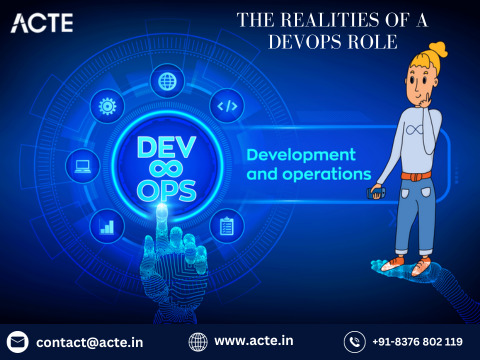
1. The Synergy of Collaboration: At the core of DevOps lies a strong emphasis on collaboration. DevOps professionals navigate the intricacies of working closely with development, operations, and cross-functional teams, fostering effective communication and teamwork to ensure an efficient software development lifecycle.
2. Orchestrating End-to-End Excellence: DevOps practitioners shoulder the responsibility for the entire software delivery pipeline. From coding and testing to deployment and monitoring, they orchestrate a seamless and continuous workflow, responding promptly to changes and challenges, resulting in faster and more reliable software delivery.
3. The Automation Symphony and IaC Choreography: Automation takes center stage in DevOps practices. DevOps professionals automate repetitive tasks, enhancing efficiency and reliability. Infrastructure as Code (IaC) adds another layer, facilitating consistent and scalable infrastructure management and further streamlining the deployment process.
4. Unveiling the CI/CD Ballet: Continuous Integration (CI) and Continuous Deployment (CD) practices form the elegant dance of DevOps. This choreography emphasizes regular integration, testing, and automated deployment, effectively identifying and addressing issues in the early stages of development.
5. Monitoring and Analytics Spotlight: DevOps professionals shine a spotlight on monitoring and analytics, utilizing specialized tools to track applications and infrastructure. This data-driven approach enables proactive issue resolution and optimization, contributing to the overall health and efficiency of the system.
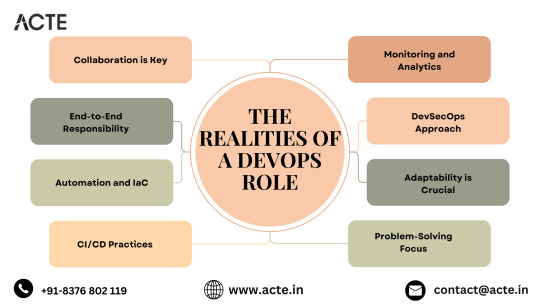
6. The Art of DevSecOps: Security is not a mere brushstroke; it's woven into the canvas of DevOps through the DevSecOps approach. Collaboration with security teams ensures that security measures are seamlessly integrated throughout the software development lifecycle, fortifying the system against vulnerabilities.
7. Navigating the Ever-Evolving Terrain: Adaptability is the compass guiding DevOps professionals through the ever-evolving landscape. Staying abreast of emerging technologies, industry best practices, and evolving methodologies is crucial for success in this dynamic environment.
8. Crafting Solutions with Precision: DevOps professionals are artisans in problem-solving. They skillfully troubleshoot issues, identify root causes, and implement solutions to enhance system reliability and performance, contributing to a resilient and robust software infrastructure.
9. On-Call Symphony: In some organizations, DevOps professionals play a role in an on-call rotation. This symphony involves addressing operational issues beyond regular working hours, underscoring the commitment to maintaining system stability and availability.
10. The Ongoing Learning Odyssey: DevOps is an ever-evolving journey of learning. DevOps professionals actively engage in ongoing skill development, participate in conferences, and connect with the broader DevOps community to stay at the forefront of the latest trends and innovations, ensuring they remain masters of their craft.
In essence, a DevOps role is a voyage into the heart of modern software development practices. With a harmonious blend of technical prowess, collaboration, and adaptability, DevOps professionals navigate the landscape, orchestrating excellence in the efficient and reliable delivery of cutting-edge software solutions.
3 notes
·
View notes
Text
What Does a Python Developer Actually Do? Career Guide
Python developers are at the core of modern tech innovations — from web apps and automation scripts to machine learning and data analysis. But what exactly do they do daily, and how can you become one? Here’s a complete guide to understanding the role of a Python developer, their responsibilities, required skills, career path, and growth opportunities.
🧠 Role of a Python Developer
A Python developer writes, tests, and maintains code using Python to build software and solve problems. They work across various domains such as web development, data science, automation, AI/ML, DevOps, and testing. Their primary focus is to build scalable, reliable, and readable code that meets specific business needs.
🔧 Key Responsibilities
Designing and developing applications using Python
Writing reusable, testable, and efficient code
Integrating user-facing elements with server-side logic
Working with databases (SQL, NoSQL)
Troubleshooting, debugging, and optimizing code
Collaborating with front-end developers and DevOps teams
Automating repetitive tasks or workflows
Developing machine learning models (for specialized roles)
🛠️ Tools and Technologies Used
Frameworks: Django, Flask, FastAPI
Libraries: Pandas, NumPy, Matplotlib, Scikit-learn, TensorFlow
Databases: MySQL, PostgreSQL, MongoDB
Version Control: Git, GitHub
Testing: PyTest, Unittest
Cloud & Deployment: AWS, Azure, Docker, CI/CD tools
🏗️ Skills Required
Strong command of core Python concepts
Understanding of OOP and design patterns
Knowledge of RESTful APIs and web services
Familiarity with front-end technologies (HTML, CSS, JavaScript)
Problem-solving and analytical thinking
Basic understanding of DevOps and deployment
🎓 Who Hires Python Developers?
IT and software companies
Startups and fintech firms
Data science & analytics agencies
E-commerce and healthcare platforms
EdTech and SaaS-based companies
💼 Career Path & Job Roles
Junior Python Developer
Python Web Developer
Automation Engineer
Data Analyst / Data Scientist
Machine Learning Engineer
Backend Developer
DevOps Engineer (Python scripting focus)
💰 Salary Scope in India
Entry-level: ₹3–6 LPA
Mid-level: ₹7–12 LPA
Senior-level: ₹13–25 LPA (depending on domain expertise)
🚀 Want to Become a Python Developer?
Whether you’re a student, recent graduate, or IT professional looking to switch, mastering Python can unlock high-paying job opportunities. Need help with Python assignments, learning roadmaps, or project support? Get expert help now at AllHomeworkAssignments.com — your trusted source for Python tutoring and assignment solutions.
#PythonDeveloper#PythonCareerGuide#LearnPython2025#PythonJobsIndia#PythonProgramming#AllHomeworkAssignments#CodingCareer
0 notes
Text
What is SRE Certification? Your Complete Guide to GSDC SRE Foundation
In today’s digital economy, ensuring system reliability and performance is critical for business success. Earning an SRE foundation certification equips professionals with the skills to manage scalable and reliable systems. The GSDC SRE Foundation program is a globally recognized credential designed to elevate your expertise in Site Reliability Engineering.
📘 What is SRE Certification? What is SRE certification? It’s a credential that validates your ability to apply software engineering principles to IT operations. The SRE certification exam covers key concepts such as SLAs, error budgets, automation, monitoring, and incident response. Completing the GSDC SRE certification prepares professionals to enhance system reliability in fast-paced environments.
💰 SRE Foundation Certification Cost One of the most common questions is about the SRE foundation certification cost. GSDC offers this program at a competitive rate, making it an accessible option for professionals worldwide. Whether you’re in a DevOps role or IT operations, the SRE foundation exam is an investment in your future.
🎓 Why Pursue DevOps SRE Certification? The DevOps SRE certification bridges the gap between development and operations. It enables teams to deliver reliable services at scale. With increasing demand for GSDC SRE foundation certified professionals, this credential helps you stand out in the job market.
🚀 Who Should Enroll?
DevOps Engineers
IT Operations Professionals
Software Developers
Site Reliability Engineers
If you’re ready to elevate your career, the GSDC SRE Foundation is the ideal starting point. Pass the SRE certification exam and become a leader in reliability engineering!
🔗 Learn more https://www.gsdcouncil.org/certified-site-reliability-engineer-foundation #SRECertification #WhatIsSRECertification #SREFoundationExam #GSDCSREFoundation #SREFoundationCertificationCost #DevOpsSRECertification #GSDCSRECertification #SiteReliabilityEngineering
0 notes